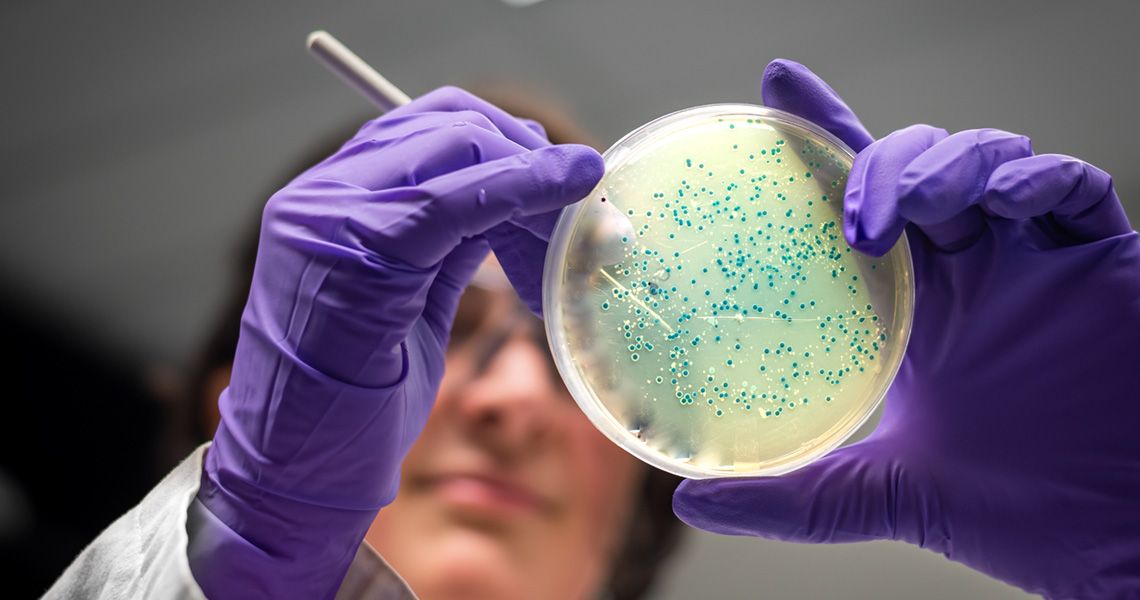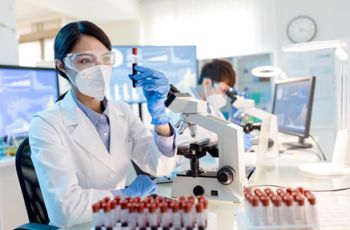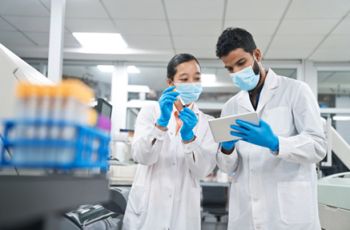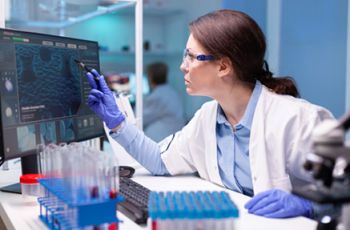Microbiology is at the heart of many scientific breakthroughs, from fighting infectious diseases to advancing biotechnology. If you are considering a career in microbiology or thinking about transitioning into this fascinating field, now is the perfect time to explore your options. This blog will discuss the benefits of a microbiology career, its educational programs at the George Washington University School of Medicine and Health Sciences’ Biomedical Laboratory Science Department (GW SMHS BLS), and why microbiologists play a crucial role in global health.
Microbiology is essential in numerous industries, including health care, environmental science, pharmaceuticals, and food safety. As a clinical microbiologist, you will be at the forefront of diagnosing and preventing infectious diseases, ensuring public health, and advancing medical research.
Career paths of why microbiology and clinical microbiology are so important:
- Public Health and Disease Control — Develop vaccines, diagnose diseases, and create treatments for infections.
- Food and Beverage Industry — Ensure food safety, prevent contamination, and improve fermentation processes.
- Environmental Science — Clean up pollutants, develop sustainable energy sources, and study microbial ecosystems to protect the planet.
- Biotechnology and Pharmaceuticals — Contribute to drug development, genetic engineering, and the production of antibiotics and probiotics.
- Forensic Microbiology — Help solve crimes by analyzing biological evidence.
- Disease Diagnosis and Treatment — Analyze patient samples to detect bacteria, viruses, fungi, and parasites
- Infection Control and Public Health — Work closely with epidemiologists to track disease outbreaks and implement infection control measures in hospitals and communities.
- Antimicrobial Resistance Monitoring — Play a critical role in detecting antibiotic-resistant strains of bacteria and guide appropriate antimicrobial therapy.
- Vaccine and Diagnostic Test Development — Contribute to the development of vaccines and rapid diagnostic tests for emerging infectious diseases.
- Hospital and Laboratory Management — Ensure accurate test results and maintain quality control.
The Importance of Microbiology Certification is crucial for career advancement in clinical microbiology. Many employers require certification to ensure competency in laboratory techniques and adherence to industry standards. Obtaining certification not only enhances job prospects but also demonstrates expertise and commitment to maintaining high professional standards in clinical microbiology.
Key certifications to consider:
- American Society for Clinical Pathology (ASCP) Certification — ASCP offers certifications such as the Technologist in Microbiology, Medical Laboratory Scientist (MLS), and Specialist in Microbiology (SM) credentials; each highly valued in the field.
- National Registry of Certified Microbiologists (NRCM) — Provides certification for clinical microbiologists specializing in diagnostic microbiology and laboratory management.
- American Board of Medical Microbiology (ABMM) Certification — A prestigious certification for doctoral-level microbiologists pursuing leadership roles in clinical laboratories.
- Certified in Infection Control (CIC) — Ideal for microbiologists working in hospital infection prevention and control.
Whether you are just starting or transitioning into the field, obtaining the right education and certification will set you on the path to success. Below are some options:
- Bachelor’s Degree in Microbiology or Medical Laboratory Science — This foundational degree prepares students to work in hospital or private diagnostic laboratories, public health laboratories, and research laboratories.
- Master’s and PhD Programs in Clinical Microbiology — Advanced degrees are essential for leadership positions, clinical research, and teaching roles.
- Medical Laboratory Science (MLS) Programs — These programs provide specialized training in clinical microbiology, preparing graduates for certification exams.
- Online and Certification Programs — Short-term specialized courses in clinical microbiology, molecular diagnostics, and infectious disease testing.
If you are looking to move into the Microbiology field or advance your Microbiology career, GW’s BLS department has several educational programs for you:
- Bachelor of Science in Health Sciences in Medical Laboratory Sciences (MLS). This program is ideal for people who want to become MLS-certified and work in a clinical laboratory to aid in the diagnosis of human disease.
- Bachelor of Science in Health Sciences in Medical Genetics and Molecular Biology (MGMB) with a concentration in Microbiology. This program is ideal for individuals that want to be on the cutting edge performing molecular and genetic techniques to diagnose infectious diseases and to identify and combat antimicrobial resistance.
- Dual Degree Bachelor of Science in Health Sciences in Medical Genetics and Molecular Biology (MGMB) and Master of Science in Health Sciences in Clinical Microbiology. This program is for individuals that want to obtain a bachelor’s degree and a graduate degree in a flelxible, timely and cost-effective format. These two degrees will allow you to become board certified in Molecular Biology and Microbiology.
- Post-baccalaureate Certificate in Microbiology in Medical Laboratory Sciences. This program is ideal for people who have a bachelor’s degree and want to become certified clinical microbiologists and work in a microbiology laboratory. This program is also well suited to individuals who are already MLS- or microbiologist-certified, have lab experience, and are looking to enhance their theoretical knowledge for the specialist in microbiology board of certification exam.
- Master of Science in Health Sciences (MSHS) in Clinical Microbiology. This program is ideal for those with a bachelor’s degree who want to become a certified clinical microbiologist and work in a microbiology laboratory. It is also well suited to individuals who are already MLS- or Microbiology-certified, have lab experience, and are looking to enhance their theoretical knowledge for the specialist in microbiology board certification exam. Obtaining a graduate degree is ideal for those who want to move into laboratory supervisory/leadership positions.
- MSHS in Biomedical Laboratory Sciences with a concentration in Translational Microbiology. This program is ideal for people who have a bachelor’s degree and are already working in a microbiology lab, but want to move into a supervisory or leadership position. It is also ideal for people who want to work in a microbiology research lab as a laboratory manager.
Take the first step today and embark on a journey to explore the invisible yet incredibly powerful world of being a microbiologist!
- Identify Your Interests — Whether it’s medical microbiology, environmental applications, biotechnology, diagnostic microbiology, antimicrobial resistance, or molecular pathology, focus on an area that excites you.
- Find the Right Program — Determine what your end goal is. Do you want an advanced degree, or are you more interested in the fastest route to a microbiology career?
- Gain Hands-On Experience — Our BSHS in MLS, BSHS in MGMB with microbiology concentration, post-baccalaureate certificate in Microbiology for MLS, and MSHS in Clinical Microbiology programs include a required practicum that will strengthen your skills. Internships, clinical rotations, and lab research will strengthen your skills and resume.
- Earn Certification — Prepare for and obtain relevant microbiology certifications to enhance your qualifications. Our clinical programs provide eligibility to take the national board of certification exams.
- Network with Professionals — Join microbiology associations, attend conferences, and connect with experts in the field.
- Stay Updated — Microbiology and clinical microbiology are constantly evolving; continuing education and professional development are essential for success.
If you need more assistance determining which program is right for you? Get in touch with an admissions representative.



